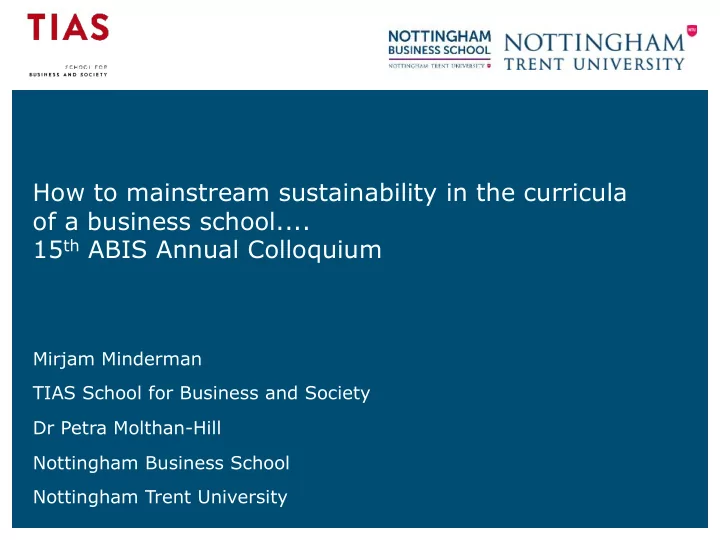

How to mainstream sustainability in the curricula of a business school.... 15 th ABIS Annual Colloquium Mirjam Minderman TIAS School for Business and Society Dr Petra Molthan-Hill Nottingham Business School Nottingham Trent University
Mainstreaming, why? Transformational Leadership Skills (Accenture, 2013: 51) 3 November 2016 2
Proposed new framework for embedding sustainability into the business school curriculum (Molthan-Hill 2014) Integrated approach Specialist approach Trans-disciplinary approach : Subject- Sustainability Subject- Additional Sustainability Subject- Sustainability Practical specific literacy skills specific sustainability literacy skills and trans- literacy skills application Narrow knowledge knowledge knowledge disciplinary (e.g. systems (e.g. systems (e.g. to (Modules) specific thinking) thinking) business) knowledge Broad (Whole curriculum) General sustainability knowledge (needs to be offered whatever the approach, might build on previous education, e.g. school) Required Philosophical assumptions and values reflection Optional (can be decided for students) Strategic decision-making: graduate attributes, learning outcomes, quality process, key decision-makers Required MOLTHAN-HILL, P. (Ed) 2014. The business student's guide to sustainable management: principles and practice , Sheffield: Greenleaf 3 November 2016 3
Why did NBS choose a mainstreaming approach? Our School mission is: "To provide education and research that combines academic excellence with impact upon business and society". Our mission emphasises our central commitment to creating, advancing and disseminating business relevant knowledge with application and utility…. Underpinning the mission is a view of business as a vehicle for wealth creation and as a force for economic and social betterment. By helping to shape and develop business practice and talent, and by emphasising the 'social contract' that exists between business and the communities in which it takes place, we effect not only change in commercial life but also within wider society. This School-based mission links directly to the mission of Nottingham Trent University and its emphasis on "shaping lives and society." 3 November 2016 4
Change of era or era of change? Technological progress creates new economic realities that revolutionizes innovation, production and distribution Rising ecological challenges prompt both industry and the public to put increasing value on conducting business in ecologically sustainable ways Structural demographic changes like aging, immigration, urbanization will have tremendous impact on business and society Uncontrolled market capitalism, irresponsible risk taking, narrow self- interest/fraud (private/public) etc. triggered a demand for moral re-grounding and institutional reforms TIAS empowers people and organizations towards this new context
TIAS School for Business and Society • Businesses, public entities and (civil) society need to co-operate in order to solve social and environmental issues and to create shared value • Strategy process resulting in renewed mission, vision and name: TIAS School for Business and Society Ø Holistic, integrative approach needed
Issue 1 - How to define sustainability? 3 November 2016 7
Focus on challenge: The Sustainability in Practice Certificate (SiP) 3 November 2016 8
TIAS School for Business and Society • Businesses, public entities and (civil) society need to co-operate in order to solve social and environmental issues and to create (shared) value • Focus on the interconnectedness of Business and Society
Business and Society Competency Framework • Integral approach to Business and Society • 4 competency areas: Responsible Leadership, Collaboration, Business Modelling and Sustainable Innovation • Based on internal and external sources from theory and practice • Balancing coherence with tailor-made implementation • Toolkit to support further implementation
TIAS B&S Competency Framework
Issue 2 - How to engage colleagues? • No time • No knowledge • Not relevant • Difficult to change existing curricula • … Ø Offer instead of ask… 3 November 2016 12
Business and Society Toolkit • Background and basic definitions (-> shared understanding) • Best practices from within TIAS in order to: – Make concepts more concrete – Make visible what already exists – Provide examples and inspiration – Stimulate (cross-disciplinary) collaboration • Materials and sources that can be used in education • Providing names of faculty that have a link to a competency area Ø Toolkit as a living document: input is very welcome!
Business and Society Toolkit • Good starting point for dialogue • Start where change is needed anyway • Link educational innovation (f.e. serious gaming) Ø Bottom line: preserve and better showcase the many valuable initiatives that already have been established within TIAS Ø Ensure a more grounded and coherent approach Ø Based on this approach, identify space for further integration
Ready to use: Case studies, Games etc. The ESD Future Thinking Learning Room 3 November 2016 15
Resources for each of the United Nations Sustainable Development Goals 3 November 2016 16
Resources for each of the disciplines within the Business School 3 November 2016 17
3 November 2016 18
Community/Estate Case Studies • 24 newly created case studies relating to NTU based projects that have been designed for teaching purposes. • Multi-disciplinary. • Linked to the SDGs. • A new way of embedding sustainability into the curriculum. • Connect the ‘ subliminal ’ curriculum to the formal one. 3 November 2016 19
Issue 3 – How to engage students? 3 November 2016 20
The Greenhouse Gas Management Project 3 November 2016 21
Engaging more students • By embedding the teaching content of the Sustainability in Practice Certificate within both Masters and Undergraduate modules at NBS as a compulsory element since 2014, each year approximately 250 and 900 students respectively were encouraged to explore the meanings of sustainability and food. • And make it fun…. 3 November 2016 22
3 November 2016 23
TIAS School for Business and Society • Mainly Executive education • Individual contributions, incl. guest speakers • FT MScBA Student Consultancy • Students start asking questions
Issue 4 – Further integration 3 November 2016 25
A new framework for the future 3 November 2016 26
TIAS School for Business and Society Ø Balance top-down vs bottom-up Ø Inclusion of external stakeholders (Advisory Board, LABs) Ø Useful in accreditations Ø Tension sustainability rankings Ø It takes time…
Thank you for listening. 3 November 2016 28
Recommend
More recommend